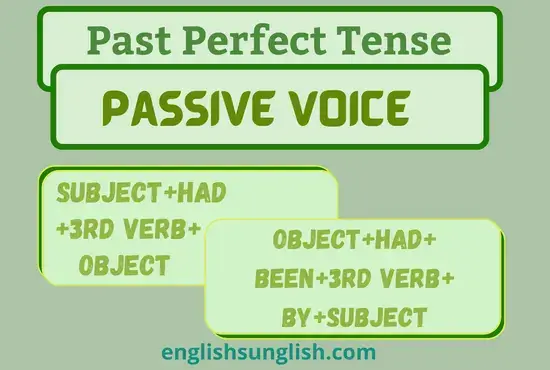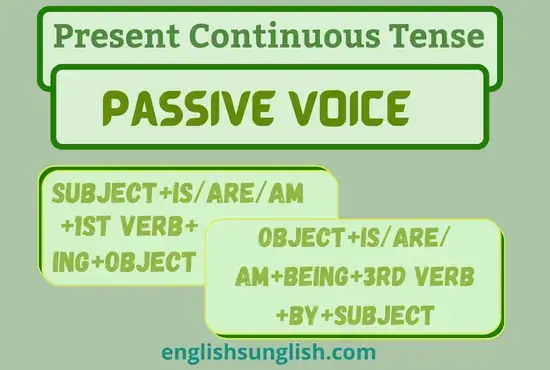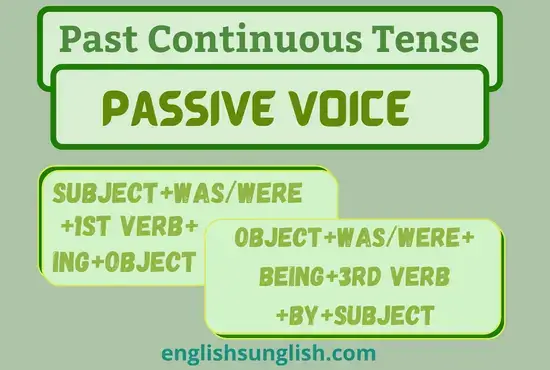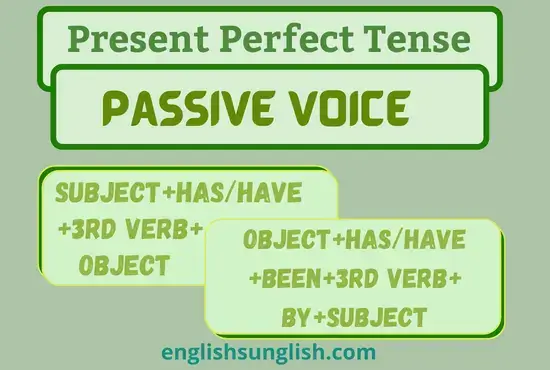Simple Present Indefinite Tense-passive Voice
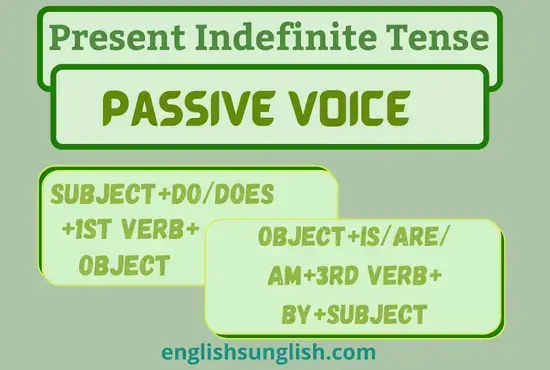
Active Voice Sentences of Simple Present Tense or Present Indefinite Tense have both active and passive forms. Active Voice Sentences of Simple Present Tense or Present Indefinite Tense can be changed into Passive Voice Sentences by following the following rules.
However, before learning and going to learn to make Passive Voice Sentences of Present Indefinite Tense, it is very necessary to enhance your vocabulary. And in this regard, grammar-related games like Wordle Unlimited may prove helpful.
Another way to improve your vocabulary is by using an online grammar checker. It will help you learn more about grammar errors and punctuation rules and help you in writing better sentences
Helping Verbs of passive Voice of Simple Present Tense or Present Indefinite Tense
Passive Voice of Simple Present Tense or Present Indefinite Tense uses the following helping verbs with respective number nouns and pronouns.
“Is” As Helping Verb in Simple Present Tense or Present Indefinite Tense
“Is” is used as a helping verb in the Passive Voice of the Simple Present Tense or Present Indefinite Tense with the singular nouns and pronouns, to show the passive habitual actions of the present.

“Are” a Helping Verb in Simple Present Tense or Present Indefinite Tense
“Are” is used as a helping verb in the Passive Voice of Simple Present Tense or Present Indefinite Tense with plural nouns and pronouns to show the passive habitual actions of the present time.
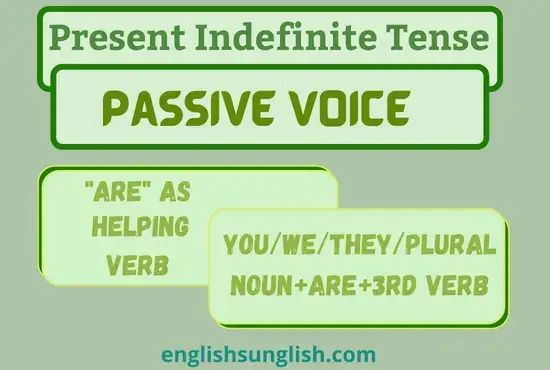
“Am As Helping Verb In Simple Present Tense
“Am” is used as a helping verb with the pronoun “I”, while converting the active voice form of the Present Indefinite Tense or Simple Present Tense to the Passive Voice form.

Sentence Structure of Passive Voice of Simple Present Tense
Following are the General Sentence Formula or Structure for Assertive, Negative, Interrogative, and Negative-Interrogative Sentences of Passive Voice of Simple Present Tense or Present Indefinite Tense.
Passive Voice of Assertive Sentences of Simple Present Tense
The Passive Voice of Assertive Sentences/Declarative Sentences of Simple Present Tense or Present Indefinite Tense can be made by applying the following steps:
- Convert the object of the Active Voice Sentence into the subject of the Passive Voice Sentence.
- Use helping verbs “is/are/am” according to the subject of the Passive Voice sentence.
- Use 3rd form of the verb.
- Then add the word “by”, to show the doer.
- Then convert the subject of the Active Voice Sentence into the object of the Passive Voice Sentence.
- At the end put the remaining words if there are any in the Active Voice Sentence of the Assertive Sentence.

Examples of Passive Voice of Assertive Sentence of Simple Present Indefinite Tense
- I break a cup.
- A cup is broken by me.
- My mother beats me.
- I am beaten by my mother.
- My mother loves me.
- I am loved by my mother.
- We speak the truth.
- The truth is spoken by us.
- You boil eggs.
- Eggs are boiled by you.
- They eat apples.
- Apples are eaten by them.
- They read this book every day.
- This book is read by them every day.
- You praise her very much.
- She is praised by you very much
- He kills a snake.
- A snake is killed by him.
- We play football in the afternoon.
- Football is played by us in the afternoon.
- I learn this poem by heart.
- This poem is learned by me by heart.
- He boils eggs.
- Eggs are boiled by him.
- They make a noise.
- A noise is made by them.
- My father punishes me.
- I am punished by my father.
- We play the match.
- The match is played by us.
- He checks tickets.
- Tickets are checked by him.
- They break locks.
- Locks are broken by them.
- Her mother beats her.
- She is beaten by her mother.
- She milks the cow.
- The cow is milked by her.
- He writes these letters.
- These letters are written by him.
- They sing a song.
- A song is sung by them.
- She eats apples.
- Apples are eaten by her.
- He learns this poem by heart.
- This poem is learned by him by heart.
- He buys these apples.
- These apples are bought by him.
- He sells tickets.
- Tickets are sold by him.
- They eat apples.
- Apples are eaten by them.
- He sees the moon.
- The moon is seen by him.
- We read the Holy Quran in the morning every day.
- The Holy Quran is read by us in the morning every day
- She helps them.
- They are helped by her.
- I hear her cries even now.
- Her cries are heard by me even now.
- She writes a letter.
- A letter is written by her.
- We play football.
- Football is played by us.
- They buy beautiful books.
- Beautiful books are bought by them.
- She hates him.
- He is hated by her.
- We obey our parents.
- Our parents are obeyed by us.
- He writes a letter to his mother.
- A letter is written by him to his mother.
- He calls you names.
- You are called names by him.
Passive Voice of Negative Sentences of Present Indefinite Tense
The Active Voice of the Negative Sentences of Simple Present Tense or Present Indefinite Tense can be converted into Passive Voice by applying the following method:
- Convert the object of the Active Voice Sentence into the subject of the Passive Voice Sentence.
- Use helping verbs “is/are/am” according to the subject of the Passive Voice sentence.
- Then add “not”, to show the negativity of the sentence.
- Use 3rd form of the verb.
- Then add the word “by”, to show the doer.
- Then convert the subject of the Active Voice Sentence into the object of the Passive Voice Sentence.
- In the end, add the remaining words if there are any in the Active Voice of the Negative Sentence.

Examples of Passive Voice of Negative Sentences of Simple Present Indefinite Tense
- She does not tell a lie.
- A lie is not told by her.
- She does not wash my clothes.
- My clothes are not washed by her.
- I do not teach them English.
- They are not taught English by me.
- English is not taught to them by me.
- They do not break toys.
- Toys are not broken by them.
- We do not like sweets.
- Sweets are not liked by us.
- I do not call the roll.
- The roll is not called by me.
- He does not teach them English.
- They are not taught English by him.
- English is not taught to them by him.
- I do not tell a lie.
- A lie is not told by me.
- I do not punish them.
- They are not punished by me.
- You do not speak the truth.
- The truth is not spoken by you.
- We do not play football in the morning.
- Football is not played by us in the morning.
- We do not sell these books.
- These books are not sold by us.
- You do not write a letter to him.
- A letter is not written by you to him.
- She does not pluck flowers.
- Flowers are not plucked by her.
- They do not beat me.
- I am not beaten by them.
- He does not like this house.
- This house is not liked by him.
- My brother does not occupy those rooms.
- Those rooms are not occupied by my brother.
Passive Voice of Interrogative Sentences of Simple Present Tense or Present Indefinite Tense
The Passive Voice of the Interrogative Sentences of Simple Present Tense or Present Indefinite Tense can be made by applying the following procedure:
- Use helping verbs is/are/am according to the subject of the Passive Voice sentence.
- Convert the object of the Active Voice Sentence into the subject of the Passive Voice Sentence.
- Use 3rd form of the verb.
- Then add the word “by”, to show the doer.
- Then convert the subject of the Active Voice Sentence into the object of the Passive Voice Sentence.
- After that put the remaining words if there are any in the Active Voice of the Interrogative Sentence.
- In the end, use the sign of interrogation”?”, to show the interrogative nature of the sentence.

Examples of Passive Voice of Interrogative Sentences of Simple Present Tense or Present Indefinite Tense
- Do you sell potatoes?
- Are potatoes sold by you?
- Do you draw a map of Pakistan?
- Is a map of Pakistan drawn by you?
- Does he sing the song?
- Is the song sung by him?
- Do we help them in every way?
- Are they helped by us in every way?
- Do you polish your shoes yourself?
- Are your shoes polished by you?
- Does she see the moon?
- Is the moon seen by her?
- Do they call us by name?
- Are we called by them by name?
- Does he pull the chain?
- Is the chain pulled by him?
- Does she pluck flowers?
- Are flowers plucked by her?
- Does the policeman stop me?
- Am I stopped by the policeman?
- Do they dislike me?
- Am I disliked by them?
- Does his father punish him?
- Is he punished by his father?
- Does she pluck these flowers?
- Are these flowers plucked by her?
- Does he select me for this post?
- Am I selected by him for this post?
- Does she scold him?
- Is he scolded by her?
Passive Voice of Negative-Interrogative Sentences of Simple Present Tense or Present Indefinite Tense
The Passive Voice of the Negative-Interrogative Sentences of Simple Present Tense or Present Indefinite Tense can be made by following the following steps:
- Use helping verbs “is/are/am” according to the subject of the Passive Voice Sentence.
- Convert the object of the Active Voice Sentence into the subject of the Passive Voice Sentence.
- Then use the word “not”, to show the negativity of the sentence.
- Then use 3rd form of the verb.
- Then, add the word “by”, to show the doer.
- Then by converting the subject of the Active Voice Sentence into the object of the Passive Voice Sentence.
- After that put the remaining words if there are any in the Active Voice Sentence of the Negative-Interrogative Sentence.
- At the end use the sign of interrogation”?”, to show the interrogative nature of the sentence.

Examples of Passive Voice of Negative-Interrogative Sentences of Present Indefinite Tense or Simple Present Tense
- Do you not sell potatoes?
- Are potatoes not sold by you?
- Do you not draw a map of Pakistan?
- Is a map of Pakistan not drawn by you?
- Does he not sing a song?
- Is a song not sung by him?
- Do we not help them in every way?
- Are they not helped by us in every way?
- Do you not polish your shoes?
- Are your shoes not polished by you?
- Does she not see the moon?
- Is the moon not seen by her?
- Do they not punish us?
- Are we not punished by them?
- Does he not pull the chain?
- Is the chain not pulled by him?
- Does she not pluck flowers?
- Are flowers not plucked by her?
- Does the policeman not stop me?
- Am I not stopped by the policeman?
- Do they not dislike me?
- Am I not disliked by them?
- Does his father not punish him?
- Is he not punished by his father?
- Does she not pluck these flowers?
- Are these flowers not plucked by her?
- Does he not select me for this post?
- Am I not selected by him for this post?
- Does she not photograph him?
- Is he not photographed by her?
Simple Present Tense or Present Indefinite Tense- Active Voice
In the Active Voice Sentence of the Simple Present Tense or Present Indefinite Tense, “do/ does” are used with their respective pronouns and number nouns. The following article has full rules for making Active Voice Sentences of Present Indefinite Tense:
